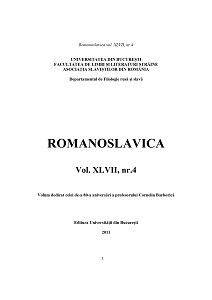Debut, ktorý zrkadlí i presahuje rod svojej autorky a dobu svojho vzniku
A debut that reflects and transcends the gender of its author and the time of its creation
Author(s): Derek RebroSubject(s): Gender Studies, Semiotics / Semiology, Slovak Literature, Theory of Literature, Sociology of Literature
Published by: Editura Universităţii din Bucureşti
Keywords: Tatjana Lehenova; slovak poetry; gender; écriture féminine; écriture du corps; ambivalence; nonstereotypical writing;
Summary/Abstract: Tatjana Lehenová was one of the first to come up with demythologization of gender traditions in Slovakia. Her lyric subject keeps men in distance, ironically commenting asymmetries in partnership. She captures disintegration of relationships, including her own, and challenges the romantic notion of love. She rarely reveals her emotions. Ambivalent - rational and emotional - attitude creates a significant source of tension in the poems. Although the subject separates from the crowd and brings together with those on the edge and atmosphere of the collection is connected to bohemian, decadent and beat gestures, but even in this case subject keeps the distance. Lehenová undermines traditional gender stereotypes by distancing herself from the naive and reflective form of a relationship. She also breaches the image of working woman of those days: emancipation from above. She reflects hiding women behind „men's backs“. Besides the physical way of writing (écriture du corps), Lehenová creates functional verbal dialogue between substandard and vulgar vocabulary on one hand and deminutivs on the other. It is impressive how she combines charging or detached passages with more abstract and poetic passages. Dialogue and the ambivalent nature of the verses is suited to larger extension of poems. Form of poems is related with trends of postmodern literature of that period: pluralism, parody, ironization, dissolving boundaries between high and low art etc. „Silence“ and „dumbness“ is present in the collection several times: e.g. as the silence between the partners. We can read it also as protest against androcentric language or as "external silence". It is also related to the potency of new language options. The subject is aware of the devastating power of silence in a partnership that leads to revolution and thus improving the partnership status or terminating it. Allegorically, we can apply it on problem of silence as subversion. Lehenová also refers to the forced silence of women. The unmasking of these tactics, however, undermines it. Her poems are expressing new version of "femininity": in its non-stereotypical gender, ambivalent, emotional-rational way. In keeping with the thinking of authors of écriture féminine she is trying to write playful semiotic through the symbolic language. Lehenova´s writing is far away of utopic "feminine" ideal of H. Cixous, because her subject has too strong knowledge of being part of androcentric order. Reflects it, sometimes she oversteps it for a moment, but never completely. She is connected more on ideas of J. Kristeva and L. Irigaray
Journal: Romanoslavica
- Issue Year: XLVII/2011
- Issue No: 4
- Page Range: 195-206
- Page Count: 12
- Language: Slovak

